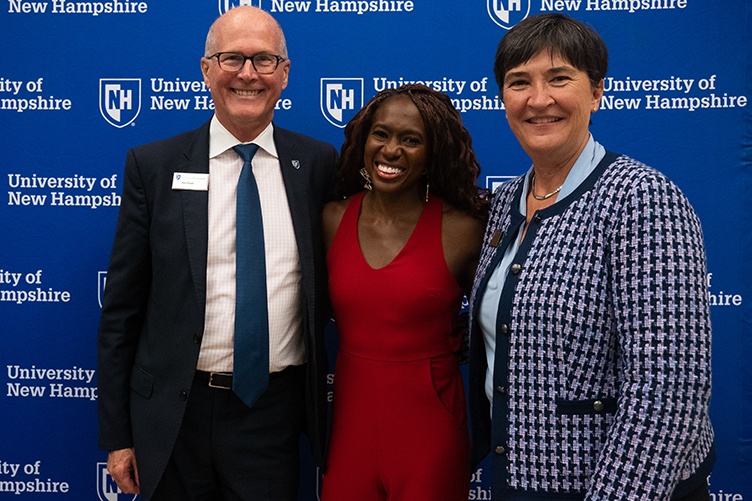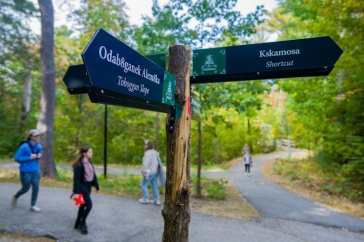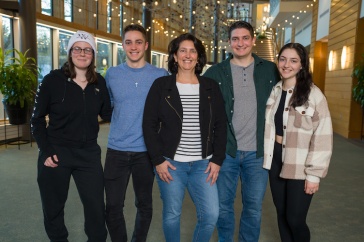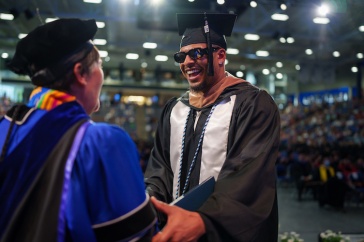
Stephanie Bramlett ‘06G ’11G is flanked by UNH President Jim Dean and Cari Moorhead, dean of the Graduate School, at the Diversity Hall of Fame induction ceremony Oct. 7.
Stephanie Bramlett ’06G ’11G admits that she received a jolt of exhilaration when she first discovered more than 25,000 YouTube views on the TEDx talk she delivered at this spring’s Portsmouth event, a leap in traffic that followed immediately on the heels of the TED organization selecting hers as a promoted presentation.
But she didn’t create the talk for the views or the accolades or the social media dopamine hits.
Her motivation was much simpler.
“I thought I had something to say,” Bramlett notes.
TED certainly agreed, choosing to amplify Bramlett’s presentation, “We Marched for Racial Justice … Now What?” among a sea of potential selections. And UNH similarly agrees, putting a tangible stamp on that stance with Bramlett’s induction into the UNH Diversity Hall of Fame during a celebration welcoming eight new inductees Oct. 7.
2022 Diversity Hall of Fame Inductees
UNH inducted eight new members into its Diversity Hall of Fame at a ceremony Oct. 7. The Diversity Hall of Fame Alumni Award is given to UNH graduates to recognize their accomplishments and commitment to social justice and equity. Recipients demonstrate a commitment to promoting diversity and inclusion on campus, work to foster progress toward respectful attitudes, behaviors and standards, as well as encouraging difference at UNH and beyond, and are for promoting diversity and inclusion through mentoring and assisting others.
The 2022 inductees include:
Wayne April '74, COLA
Mariah L. Arral '18, CEPS
Stephanie S. Bramlett '06G, '11G, GRAD
Taylor Chace '11, CHHS
Keith M. Hinderlie '88, COLA
Freda N. Katunda '12, CHHS
Jordan Long '10, CHHS
Shersingh Joseph Tumber-Dávila '15, COLSA
“UNH has been a part of my life and has had a big part of my heart since 2005 when I came as a master’s student. I absolutely stand on the shoulders of giants and can only hope I live up to the equity and inclusion vision that so many people who came before me really helped push at UNH,” Bramlett, who earned a master’s in political science and a Ph.D. in sociology, says. “To be able to receive such an award is a tremendous honor for me, and I think about all of the people who came before me, and all of the people who have not yet been admitted to the Diversity Hall of Fame who absolutely should be in there.”
Bramlett carved her path in part by building an extensive resume of success in diversity, equity and inclusion work. She is the inaugural director of equity and inclusion at Phillips Exeter Academy in Exeter, New Hampshire, and previously worked as the director of inclusive excellence and leadership at St. Luke’s School in New Canaan, Connecticut, where she also directed the Center for Leadership.
At UNH, she directed a student retention program for multicultural, first-generation and low-income college students and also helped develop the curriculum for UNH’s Martin Luther King, Jr. Leadership Summit.
It was while working at Phillips Exeter in the aftermath of the 2020 deaths of George Floyd, Breonna Taylor and Ahmaud Arbery that Bramlett first felt the stir to speak out. She recalls a “challenging time” during which she was supporting her students and colleagues while working through her own emotions, and the unsettling feeling that followed when the public fervor quieted down soon after. The protests and the bright national spotlight were gone, but the issues around racial justice still very much existed, she says.
“What can we do to bring the attention back became very, very important to me,” Bramlett says. “I thought one of the things I could share was really tangible ways to move the conversation forward after all the protests have happened.”
Bramlett’s speech urges people to continue exploring their own thoughts on the racial justice climate and offers a path for moving the conversation forward, be it through smaller acts of activism in your own community or “leaning into discomfort” by seeking out difficult conversations rather than running from them.
“That’s absolutely critical,” Bramlett says of the need for challenging discourse. “How do we hold ourselves accountable? If we are going to choose to be in a community with each other, let’s make the choice to have difficult conversations with each other. We have to have those critical conversations, and it can’t just be coming from people who have a marginalized experience. It has to be a collective effort.”
It can be difficult to begin that process, Bramlett admits, but it is an important step toward creating significant progress.
“The more you have those conversations, the more practiced you become, the easier they get. We need to see this as an opportunity to connect rather than a time to close in and deflect,” she says.
"How do we hold ourselves accountable? If we are going to choose to be in a community with each other, let's make the choice to have difficult conversations with each other."
Bramlett has spent her career focusing on creating those opportunities to connect – going well beyond racial justice to include every member of the communities she’s been a part of. She says she’s been lucky to spend time at several institutions – including UNH and Phillips Exeter – that modeled a strong commitment to that cause.
“We have to talk about income, we have to talk about socioeconomic status and class, we have to talk about gender and gender identity, we have to talk about folks in the queer community, we have to talk about our trans siblings,” Bramlett says. “I’ve been fortunate to work at schools and to be mentored by people not just thinking about diversity as multicultural affairs but thinking about multiculturalism along every cross-section of social justice.”
Bramlett wants to see those communities continue to carry the torch forward on all issues of social justice. That requires support, and a willingness to look beyond your own experience to ensure that future generations have the chance to make a difference.
“Giving back to an institution can look like a lot of things. Even if you’re not interested in investing in the school, it is about investing in and giving back to those students who are there now,” she says. “We can love an institution, we can push an institution, we can be mad at an institution sometimes and still want to invest in it, because in a huge way UNH invested in me.”
-
Written By:
Keith Testa | UNH Marketing | keith.testa@unh.edu



















































